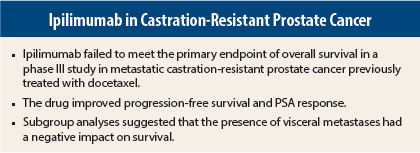Ipilimumab (Yervoy) failed to meet the primary endpoint of improving overall survival in the randomized, phase III CA184-043 trial. However, the immunotherapy did improve progression-free survival and prostate-specific antigen (PSA) response compared with placebo in postdocetaxel metastatic castration-resistant prostate cancer.
Prespecified subset analyses suggested that ipilumumab improves survival in patients with more favorable prognostic factors (ie, no visceral metastasis, lower levels of alkaline phosphatase, and elevated hemoglobin). This finding needs to be validated in future trials.
Immunotherapy Rationale
“Although the primary endpoint of this trial was not met, the antitumor activity [of ipilimumab] is suggested by other efficacy endpoints. It appears that patients with more favorable prognostic factors may be more likely to benefit from ipilimumab treatment. Results of this trial support further investigation of ipilimumab in patients with fewer adverse prognostic features than those enrolled in this trial,” said lead author Charles G. Drake, MD, PhD, Assistant Professor of Oncology, Immunology, and Urology at The Sidney Kimmel Comprehensive Cancer Center at Johns Hopkins, Baltimore. Dr. Drake presented the results of the subset analyses of overall survival at the 2014 Genitourinary Cancers Symposium in San Francisco.1
“There are several new therapies in [metastatic castration-resistant prostate cancer],” Dr. Drake noted, “but few that produce long-term responses. Immunotherapy may expand a preexisting anticancer immune response.”
The rationale for studying this new approach in castration-resistant prostate cancer was based on ipilimumab’s mechanism of action—blockade of the immune checkpoint molecule CTLA-4—as well as the success of this approach in metastatic melanoma, with about 25% of patients alive at 5 years, he said.
Study Details
The study included 799 patients with postdocetaxel metastatic castration-resistant prostate cancer. All patients received at least one dose of radiotherapy to bone-directed sites and were randomly assigned in a 1:1 ratio to ipilimumab vs placebo. Patients in the experimental arm received maintenance ipilimumab every 12 weeks, and those in the control arm received placebo every 12 weeks.
Median overall survival was 11.2 months for ipilimumab vs 10 months for placebo (hazard ratio [HR] = 0.85, 95% confidence interval [CI] = 0.72–1.00, P = .0530). The secondary endpoint of progression-free survival was met, Dr. Drake continued. Median progression-free survival was 4 months in the ipilimumab group and 3 months in the placebo group.
The investigators conducted further analyses to determine if any subgroups had a survival benefit from ipilimumab. The only factor that appeared to be of importance was the presence of visceral metastases. Median overall survival was 14.4 months with ipilimumab in patients with no visceral metastases vs 5.7 months with the immune checkpoint inhibitor in the presence of visceral metastases.
Dr. Drake acknowledged that the trial was underpowered to show an interaction between ipilimumab and visceral metastases, but he noted that the hazard ratio (HR = 1.644, 95% CI = 1.157–2.336, P = .0056) “is clearly in the wrong direction…. The bottom line is that visceral metastases interfere with the treatment effect.”
He added, “This is a retrospective analysis and hypothesis-generating.”
Multivariate Analysis
Multivariate analysis identified the following favorable prognostic factors for overall survival: age under 70 years, alkaline phosphatase < 1.5 times the upper limit of normal, hemoglobin ≥ 11 g/dL, and the absence of visceral metastases.
The safety of ipilimumab was consistent with that of other trials with this agent.
Another phase III trial of ipilimumab has been launched (CA184-095) in chemotherapy-naive castration-resistant prostate cancer, and it excludes patients with visceral metastases.
Disclosure: The study was funded by Bristol-Myers Squibb. Dr. Drake is a consultant/advisor for Bristol-Myers Squibb, Compugen, Costim Pharmaceuticals, Dendreon, and Pfizer, owns stock in Amplimmune, and has received research funding from Bristol-Myers Squibb and Janssen. For full disclosures of the study authors, visit abstracts.asco.org. ■
Reference
1. Drake CG, Kwon ED, Fizazi K, et al: Results of subset analyses on overall survival (OS) from the study CA184-043: Ipilimumab versus placebo in post-docetaxel metastatic castration-resistant prostate cancer. 2014 Genitorurinary Cancers Symposium. Abstract 2. Presented January 30, 2014.



